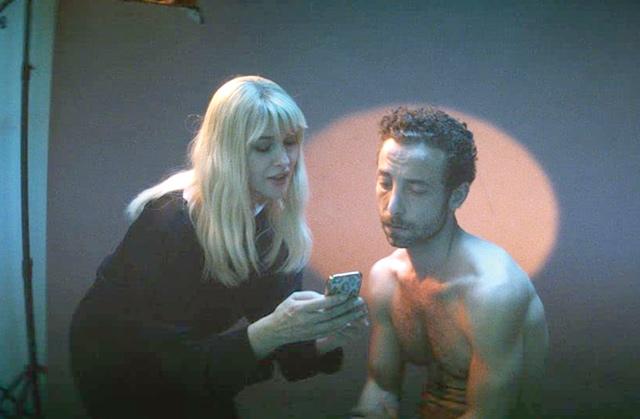You are here
Revisiting a Faustian pact
By Margaux Farran - Apr 24,2021 - Last updated at Apr 24,2021

Monica Bellucci and Yahya Mahayni (right) in ‘The Man Who Sold His Skin’ (Photo courtesy of imdb.com)
The Devil, the gentleman in search of his lost princess, dark humour and a transcendent moral at the end are all found in “The Man Who Sold His Skin” that gathers all the necessary ingredients for a fantastic modern fable, that aims to denounce the commodification of human beings and the hypocrisy of the art world.
And this recipe seems to be working; the movie is the first Tunisian production to be nominated at the 2021 Academy Awards, in the Best International Feature Film.
In this revisited Faustian pact, director Kaouther Ben Hania presents Sam Ali (Yahya Mahyani), a young Syrian man enamoured with the beautiful of Abeer (Dea Liane). So smitten that he cannot help but declare his love on a public train, in a passionate speech with revolutionary overtones that draws the attention of the regime. The two lovers are thus quickly separated in exile. While he flees to Beirut, Abeer marries an influential diplomat and follows him to Brussels.
Sam struggles to rebuild his life in Lebanon, but he is willing to do anything to join Abeer — even if it means selling his soul to the Devil. While sneaking into an art gallery to enjoy the buffet, he meets Jeffrey Godefroi (Koen de Bouw), a worldly artist who introduces himself as the Mephistopheles of contemporary art. He proposes a surprising pact: To tattoo a Schengen visa on his back in exchange for a one-way ticket to Europe.
In his own words, by turning Sam into a canvas, the artist intends to criticise this society in which “it is easier to travel as a work of art than as a human being”.
Sam Ali accepts without hesitation, but he quickly pays the price for this pact, stifled by the hypocrisy of the contemporary art world.
If this story seems absurd, the plot is based on true events. The director based her movie on the work of Wim Delvoye, a Belgian conceptual artist known for his controversial projects. In 2006, he started to tattoo a young man named Tim and contractually transformed him into a piece of art, which participates in various exhibitions around the world three times a year in exchange for a third of the profits.
“The Man Who Sold His Skin” draws on this surprising controversy to criticise the intemperance of the art world and its hypocrisy. By opposing the world of a desperate refugee and the extravaganza of the mundane art world of the West, Ben Hania aims at criticising the marchandisation of human misery.
This satire is strongly reminiscent of Ruben Östrun’s “The Square”, which won the Palme d’Or at the 2017 Cannes Film Festival. The two films have been compared, as they both denounce the hypocrisy of the disconcerting modern art world using a sarcastic tone and surrealistic dialogues.
The actors take on the costumes of extravagant characters who accentuate the surreal dimension of the work. Mahyani stood out by his charisma and has been rewarded by the Best Actor Award at the 77th Venice Biennale. According to Ben Hania, in an interview given for the Academy Oscar, she gave Mahyani the freedom to interpret his character the way he wanted to. This freedom allowed him to transform a simple museum entrance scene into a transcendent choreography that reflects the charm and freshness of his character in search of freedom, the director said.
A majority of critics also recognised the technical quality of the film, especially its photography. The cinematographer Christophe Aoun was congratulated for his work on the aesthetic of the movie, three years after “Capharnaüm” was nomination for an Academy Award. His composition reflect the narrative of the movie: He considers the frame as an artistic canvas, using geometric shapes and a bold colour palette as if the spectators were stranded in a baroque painting with the characters.
The quality of the film carries Ben Hania’s powerful message against the commodification of misery, despite some blunders. If we forgive the film’s occasional lack of subtlety, many critics expressed their disappointment regarding the somewhat hasty ending, made of Hollywood-like turn of events, without much finesse, which contrasted with the message of the movie.
Despite this, the movie remains particularly popular in festivals, and will thus mark the year 2021. The talent of the actors, Ben Hania’s humour and the intelligence of its composition make “The Man Who Sold His Skin” a refreshing and enjoyable film in this particular year in the world of cinema.
Related Articles
TORONTO, Canada — As crowds finally flocked back to the Toronto film festival after two years thwarted by COVID-19, Hollywood’s top director
LONDON — It may be no coincidence that Agent 007’s latest love interest, played by French actress Lea Seydoux in the new James Bond movie “S
AMMAN — Denouncing the misrepresentation of Jordanian life and culture in films, many aspiring local directors and actors are striving to br

















